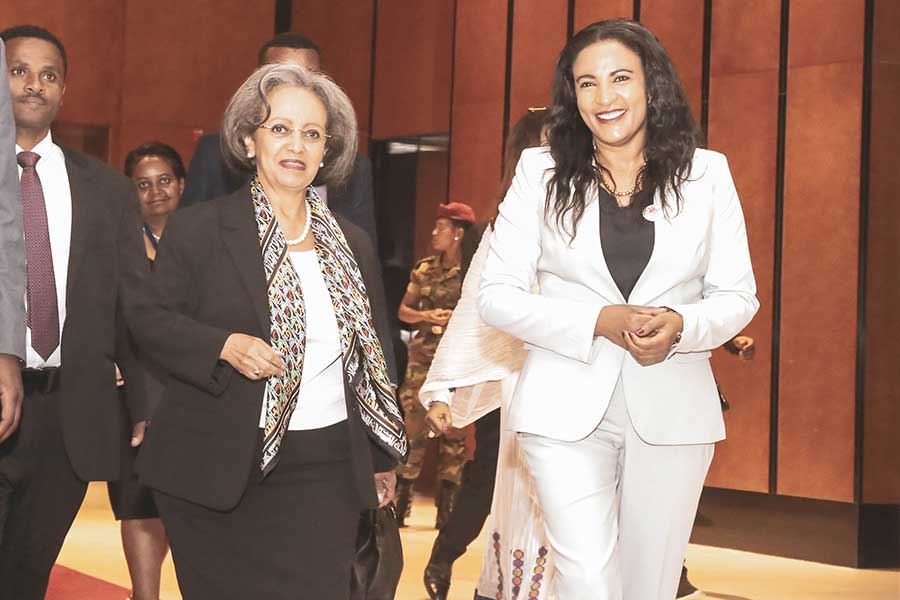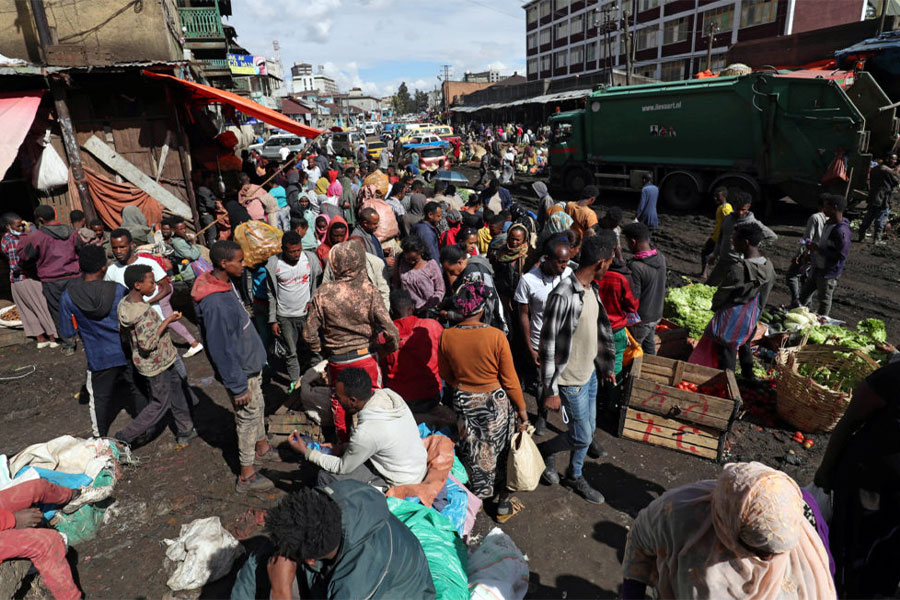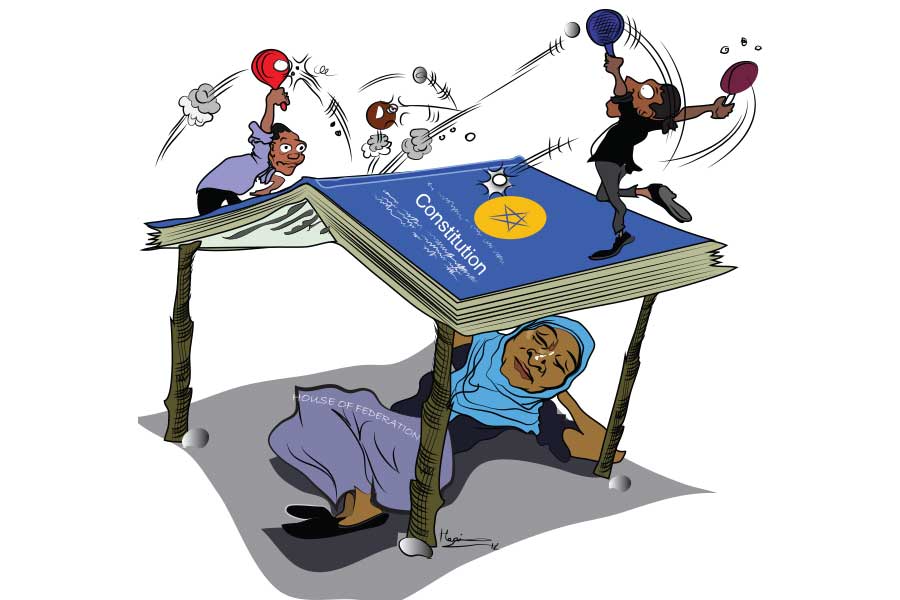
Fortune News | Aug 17,2019
Jun 20 , 2020
By Marew Abebe
It was only a couple of weeks after the first case of the Novel Coronavirus (COVID-19) pandemic was reported that the National Electoral Board of Ethiopia (NEBE) submitted a proposal to parliament to extend the national election that was scheduled for August 2020. It was a proposal that was accepted by parliamentarians.
But the postponement has raised critical constitutional questions that have never been addressed by the country’s constitutional law jurisprudence. This issue has arisen at a time when the constitutional deadlines for elections are being taken into consideration.
Although any legal measures to postpone an election is far from simple, parliament opted for the constitutional interpretation option to legitimise the postponement. Many of the incumbents believed that the only possible solution to the current constitutional crisis concerning election postponement should be addressed within the legal framework, effectively ruling out a transitional government.
Indeed, the Constitution asserts its supremacy and denies the power of any law, customary practise or decision of any organ of the state or public official. It is, therefore, illegal to assume power through any means other than, or contradictory to, the manner prescribed by the Constitution.
Still, the incumbent’s decision to require constitutional interpretation to answer the question of election postponement in Ethiopia, given the constitutional provisions that fix the term of the office of any elected parliament to be five years, brings up serious legal conundrums.
One of these is the necessity of the very act of interpreting the Constitution. This is due to the Constitution having explicit provisions that govern election schedules and determine the term of office of the parliament.
“Members of the House of Peoples’ Representatives shall be elected by the People for a term of five years on the basis of universal suffrage and by direct, free and fair elections held by secret ballot,” reads Article 54 of the Constitution.
Thus, the term of the office of the incumbent members of parliament, who were elected in May 2015, will expire sometime around September 2020. Another article determines the members should be elected for a term of five years, and that elections for a new House shall be concluded one month prior to the expiry of this term. Many have questioned what is not clear about "five years" that needs interpretation.
This brings into focus the article that allows the government to declare a state of emergency. The article, while listing grounds to declare a national emergency, does not specify anything about election postponement if the election schedule occurs amidst such extraordinary situations, such as a pandemic.
Some argue that, in the midst of a state of emergency, an election can be postponed because the Constitution does not list the right to vote and be elected as non-derogable under the article. Their logic follows that if there is not an election that can be conducted, there will not be a government, leading to a power vacuum. This is also not in the spirit and intent of the Constitution and that the incumbents, perhaps in the form of a caretaker government, should take hold.
Others would argue that voting ties in with the right to self-determination and is a non-derogable right under the state of emergency. Holding elections is one of, if not the single most crucial manifestation of self-determination, and thus cannot be postponed - another line of argument that has not sufficiently been addressed.
At this late stage, though, it seems that we are stuck with interpretation. Here, a holistic understanding of the constitution and a robust interpretation by the legitimate body is necessary for guaranteeing constitutionalism and making possible an indisputable and consistent reform in line with the ever-changing conditions of politics.
Parliament (with reservations from few MPs) has already voted and pushed the matter to the Council of Constitutional Inquiry, which is mandated to advise the House of Federation, the only body empowered by the supreme law of the land to decide on interpretation, and did decide.
Unfortunately, the process has not been as inclusive as was hoped under the circumstances. Interpretation was decided upon by parliament without sufficient discussions with opposition parties, and less than a week after four possible options for postponing the election were put forward, including the option of amending the Constitution.
Neither is the process of interpretation free from conflicts of interest. It was also a unilateral decision by the parliament, without sufficient consultation having taken place with competing political parties and before sending it to the House of Federation.
No doubt, it was not helpful that some opposition parties have suggested steps forward that are outside the constitutional boundaries. The Constitution states that the form of government should only be parliamentarian. This is in direct contradiction to what opposition parties have called for, including the option for a transitional or caretaker government. Any attempt to establish such a government would have been understood as contradicting the constitutional provisions.
More worrying is how the idea of the neutrality of the interpreter has failed to be addressed, which is primarily due to the establishment of a constitutional court. Rather, the Constitution empowers the House of Federation, a political organ, to settle all constitutional disputes.
In the debate regarding how to legitimately address postponing the election, the interpretation option brought the matter under the feet of the very body that would benefit from a postponement, the House of Federation.
Can anybody be the judge in their own case?
This eroded the credibility of the decision that was given by the House of Federation.
But postponement was as much a political problem as it was a legal one. Accompanying the legal norms with a political agreement may create a similar mode of participation for various interests and can be binding with its shortcomings. In the absence of a constitutional remedy that could create a consensus, political dialogue and consensus-building were the only real avenue for resolution of the crisis.
Given the internal political polarisations and external challenges, a short period of extension for the incumbents, with limited powers, and a consultative role for the opposition outside of government, was one of the least bad options until the next election is held after the pandemic is over.
PUBLISHED ON
Jun 20,2020 [ VOL
21 , NO
1051]


Fortune News | Aug 17,2019

Commentaries | Aug 31,2019

Commentaries | Oct 18,2025

Fortune News | Apr 20,2019

Editorial | May 08,2020

Editorial | Oct 16,2021

My Opinion | Sep 10,2021

Commentaries | Jun 18,2022

Sunday with Eden | Nov 02,2019

Radar | Jun 11,2024

Photo Gallery | 180017 Views | May 06,2019

Photo Gallery | 170212 Views | Apr 26,2019

Photo Gallery | 161215 Views | Oct 06,2021

My Opinion | 137240 Views | Aug 14,2021

Dec 22 , 2024 . By TIZITA SHEWAFERAW
Charged with transforming colossal state-owned enterprises into modern and competitiv...

Aug 18 , 2024 . By AKSAH ITALO
Although predictable Yonas Zerihun's job in the ride-hailing service is not immune to...

Jul 28 , 2024 . By TIZITA SHEWAFERAW
Unhabitual, perhaps too many, Samuel Gebreyohannes, 38, used to occasionally enjoy a couple of beers at breakfast. However, he recently swit...

Jul 13 , 2024 . By AKSAH ITALO
Investors who rely on tractors, trucks, and field vehicles for commuting, transporting commodities, and f...

Nov 1 , 2025
The National Bank of Ethiopia (NBE) issued a statement two weeks ago that appeared to...

Oct 25 , 2025
The regulatory machinery is on overdrive. In only two years, no fewer than 35 new pro...

Oct 18 , 2025
The political establishment, notably the ruling party and its top brass, has become p...

Oct 11 , 2025
Ladislas Farago, a roving Associated Press (AP) correspondent, arrived in Ethiopia in...

Nov 2 , 2025
The National Bank of Ethiopia (NBE) has scrapped the credit-growth ceiling that had s...

Nov 2 , 2025 . By SURAFEL MULUGETA
The burgeoning data mining industry is struggling with mounting concerns following th...

Nov 2 , 2025 . By YITBAREK GETACHEW
Berhan Bank has chosen a different route in its pursuit of a new headquarters, opting for a transitional building instea...

Nov 2 , 2025 . By BEZAWIT HULUAGER
Nib International Bank S.C. has found itself at the epicentre of a severe governance...